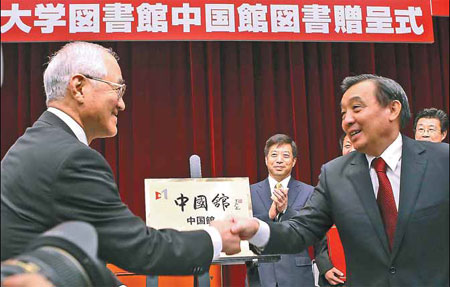

 |
|
Wang Chen (right), minister of the State Council Information Office, shakes hands with Hideo Yamamoto, president of Soka University, during the launching ceremony for the Chinese section of the university's library in Tokyo on Tuesday. Xu Jingxing / China Daily |
Donation to Japan university library may 'open a window' to students
Young souls are supposed to be the best soil to plant the seeds of friendship.
And a donation of 1,500 Chinese books to Japan's Soka University library could be the seed from which a friendship between two cultures grows. China's State Council Information Office donated the books to help the university open a Chinese section of its library.
The SCIO, which is launching an "Experience China" program in Tokyo, will continue to donate new Chinese books to Soka University library over the next decade, said Wang Chen, minister of SCIO.
"I hope the section will open a window to the students and to Japanese people when they want to know more about China," Wang said at the donation ceremony on Tuesday.
Soka University is an ideal place for the donated books because Daisaku Ikeda, one of its founders, came up with a proposal to normalize China-Japan relations in 1968 when the two countries were still technically in a state of war and anti-Chinese sentiments were widespread in Japan.
Ikeda was strongly criticized and even received death threats from right-wingers. Ikeda saw peace with China as fundamental to the stability of Asia, and considered the reintegration of China into the international community as vital to world peace. His call and behind-the-scenes efforts helped establish the groundwork for a series of political-level exchanges between China and Japan, culminating in the restoration of diplomatic relations in 1972.
Ikeda visited China and met the late Chinese Premier Zhou Enlai in 1974. Zhou told him he left Japan at a time when the cherry blossom trees were in full bloom 50 years ago. Zhou was ill and knew he could not make a trip to Japan to see the cherry blossom trees again. In 1975 Soka University enrolled the first group of Chinese students funded by the Chinese government, and planted a cherry tree on the campus. In 1979, Deng Yingchao, Zhou's wife, visited Japan and inspired Ikeda to plant a second cherry tree. Now the university has a cherry tree in the name of Zhou and another in the name of the couple.
"Young people's understanding of and feelings for each other's country is of great importance to where the bilateral relations will head," Wang said.
He said current and future generations of both countries need to take good care of China-Japan relations.
Wang extended an invitation to the students of Soka University to visit China and see the country with their own eyes.
Exchanges of young people between China and Japan have occurred since 1956, when Chinese and Japanese leaders initiated an exchange program allowing 100 Japanese young people to visit China each year.
"We will keep our exchanges with China as always," Hideo Yamamoto, president of Soka University, said when receiving the list of the donated Chinese books from Wang. "The China section of our library is the best gift for our students and the Japanese people - young people in particular."
caihong@chinadaily.com.cn